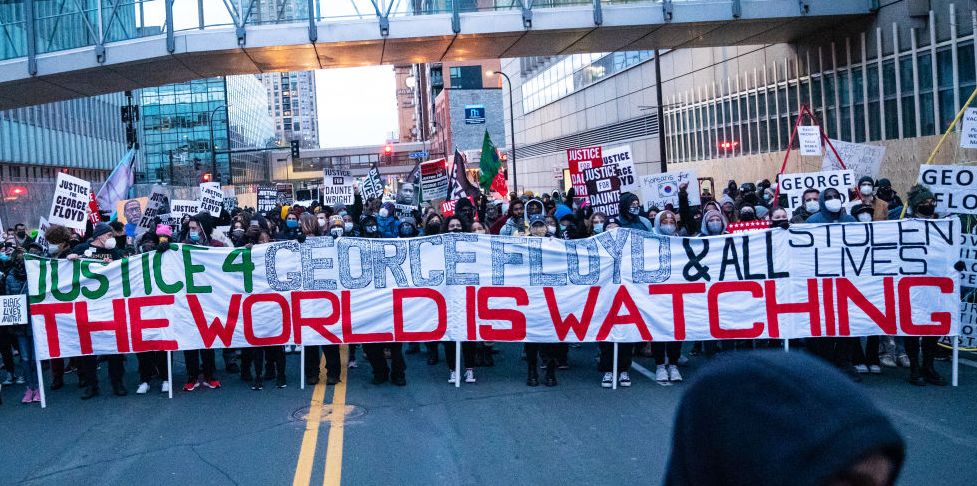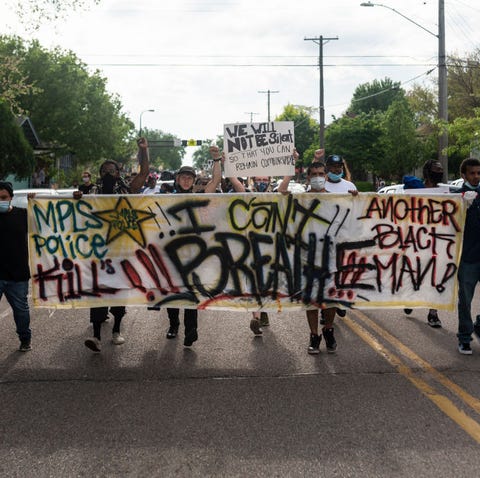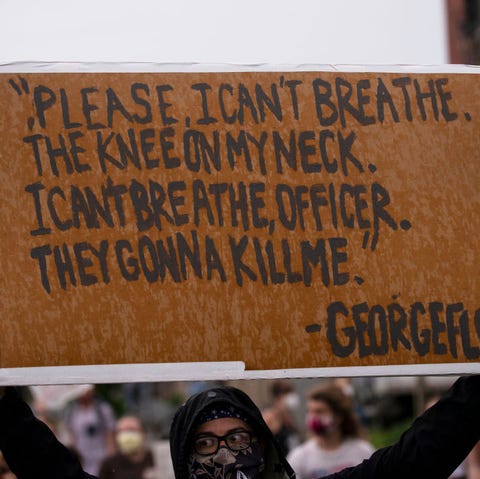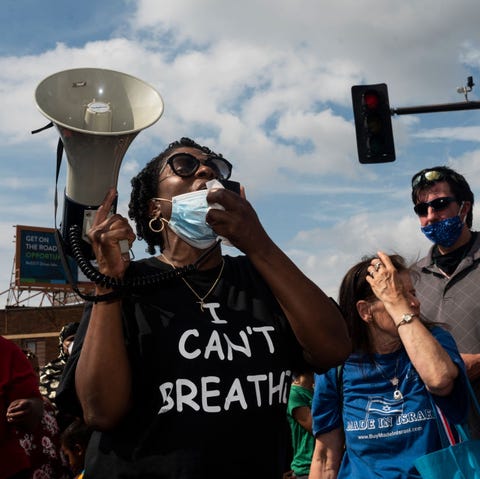Update, June 25, 2021: After a tumultuous trial, Derek Chauvin, the former Minneapolis police officer who killed George Floyd after pressing his knee against the man’s neck, is officially headed for a long-term stay in prison. The court sentenced Chauvin to 22 1/2 years following his conviction in April 2021, during which the trial was broadcast live and watched across the nation. A 12-person jury announced the verdict: Chauvin was found guilty of all charges, including second-degree unintentional murder, third-degree murder, and second-degree manslaughter.
The 45-year-old former police officer could be paroled after serving two-thirds of his sentence, per the AP, meaning he could serve a total of around 15 years. Floyd’s family and prosecutor Matthew Frank had fought for a sentence of 30 years, calling the murder “9½ minutes of cruelty to a man who was helpless and just begging for his life.”
Original post, last updated Oct. 7, 2020: On Monday, May 25, 46-year-old George Floyd died after a Minneapolis police officer pinned him to the ground and pressed his knee into his neck while Floyd pleaded for help and repeatedly said he could not breathe. The officers were reportedly responding to “a report of a counterfeit bill being passed” when they located and handcuffed Floyd, who was pronounced dead at the Hennepin County Medical Center.
The disturbing interaction was filmed and quickly shared online, and the four officers involved in the incident were fired. On October 7, Derek Chauvin, the former officer who pinned Floyd with his knee, was released from jail while he awaited trial on charges of second-degree murder and manslaughter. Chauvin had been at Hennepin County Jail since his May 29 arrested and posted $1 million in bond. The New York Times reported that Chauvin used a bail bond agency for the transaction.
“The technique that was used is not permitted; is not a technique that our officers get trained in on,” Minneapolis Mayor Jacob Frey said. “And our chief has been very clear on that piece. There is no reason to apply that kind of pressure with a knee to someone’s neck.”
The three other officers charged in connection to Floyd’s death are Thomas Lane and J.A. Kueng, who assisted in restraining Floyd, and Tou Thao, who watched the events nearby.
Benjamin Crump, an attorney for the Floyd family, told CNN back in June that he felt, “confident that these officers will be charged before people in Minneapolis say their final goodbyes to George Floyd, may he rest in peace,” referencing a public memorial scheduled in the city the following day. According to Minnesota law, third-degree murder carries a sentence of up to 25 years, and is considered when someone causes someone’s death “without intent.” Second-degree murder carries a sentence of up to 40 years.
Separate autopsies from experts hired by Floyd’s family and the Hennepin County Medical Examiner both concluded that his death was a homicide, according to CNN. However the two entities diverged on what caused the homicide. The independent autopsy said Floyd died of “asphyxiation from sustained pressure” when his neck and back were compressed by Minneapolis officers during the arrest. This means pressure cut off blood flow to his brain.
But the medical examiner’s office said Floy’d cause of death was “cardiopulmonary arrest complicating law enforcement subdual, restraint, and neck compression.” This means that Floyd’s heart failed and their release says heart disease was a factor in his death, with no mention of asphyxiation. The independent examiner didn’t find signs of heart disease.
For weeks after Floyd’s death, protestors poured into the streets of Minneapolis near the site where Floyd was arrested, chanting Floyd’s words from the video: “I can’t breathe.” The phrase is also a direct reminder of the death of Eric Garner, who said the same words in 2014, after being held in a chokehold by police in New York. Garner was later pronounced dead at a hospital.
This content is imported from Twitter. You may be able to find the same content in another format, or you may be able to find more information, at their web site.
The Minneapolis protestors were met with tear gas and rubber bullets—a stark contrast to the way police recently responded to white demonstrators who have protested for states to open back up in the midst of the COVID-19 pandemic.
This content is imported from Twitter. You may be able to find the same content in another format, or you may be able to find more information, at their web site.
On May 27, 2020, Minnesota Governor Tim Walz tweeted that the protests had turned “extremely dangerous” and urged people to leave. The next day, Walz declared a state of emergency and activated the state’s National Guard. Over the course of the week, people looted stores, and at one point, set an evacuated police precinct on fire.
While reporting on the protests in late May, a crew of CNN journalists were arrested by state police live on television after identifying themselves as members of the media. The crew has since been released from police custody.
This content is imported from Twitter. You may be able to find the same content in another format, or you may be able to find more information, at their web site.
Attorney Benjamin Crump, who is currently representing Floyd’s family, tweeted: “#GeorgeFloyd’s family thanks all of the protesters for joining them in standing for JUSTICE. They know we’re all hurting and any decent human being who watches the video of police killing their Gentle Giant will also feel shortness of breath.” Crump is a civil rights attorney who is also representing the families of Ahmaud Arbery, who was shot and killed while out for a run in Georgia, and Breonna Taylor, who was shot and killed by police in her Kentucky apartment.
If you are looking for ways to speak out against Floyd’s death, help his family, or get educated on the history of systemic racism and police violence in the United States, consider:
- Donating to the memorial fund George Floyd’s family has set up. The GoFundMe page also includes an address where anyone can send cards or contributions.
- Supporting organizations working on the ground in Minneapolis, including the Minnesota Freedom Fund, which pays bail for low-income individuals; Black Visions Collective, which works to organize black communities in Minnesota; Reclaim the Block, which works to move money from the police department into other parts of the city that promote health and safety; and the North Star Health Collective, which provides health care services and resources to protestors.
- Helping protesters with legal fees and bail-out funds and supporting organizations including the Know Your Rights Camp founded by Colin Kaepernick, the Brooklyn Bail Fund, the Bail Project, the National Bail Fund Network, the NAACP Legal Defense Fund, the ACLU, the Atlanta Solidarity Fund, and Free Them All for Public Health
- Supporting the GoFundMe for Tony McDade, the transgender man killed in Florida on May 27.
- Contacting the Minneapolis mayor and the Hennepin County attorney at 612-673-2100 and 612-348-5550, respectively. You can also email the attorney at citizeninfo@hennepin.us, or contact the Minneapolis police department at police@minneapolismn.gov.
- Continuing to educate yourself, speaking out against injustice, and expanding your anti-racism work. Writers and activists Sarah Sophie Flicker and Alyssa Klein have compiled a document of resources, if you need a place to begin. There are also several anti-racism book lists, including this and this.
- Signing a petition to demand the police officers involved are charged.
- Talking to your kids about what’s going on. There are great resources at The Conscious Kid and Teach and Transform.
- Reading more about George Floyd and how his friends and family remember him. One friend, Vanita Williams, told BuzzFeed News: “He was articulate. He was grounded. He was spiritual. He was an athlete. He was an organizer. He was a comforter. He was an encourager.”
This post will continue to be updated.
This content is created and maintained by a third party, and imported onto this page to help users provide their email addresses. You may be able to find more information about this and similar content at piano.io



